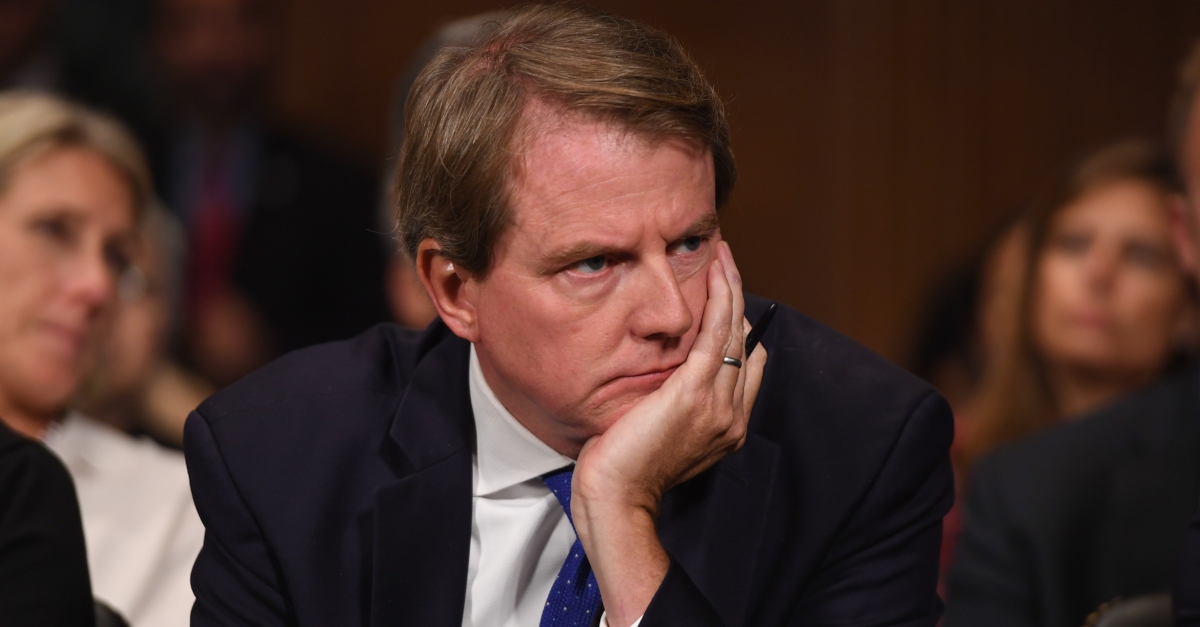
President Donald Trump reached out to former White House counsel Don McGahn “within a day of the release” of Special Counsel Robert Mueller‘s Russia report to try and get him to say that he didn’t believe the president had obstructed justice, the Wall Street Journal reported.
WSJ kept it pretty straightforward and simple for a Friday evening:
Privately, Mr. Trump asked White House special counsel Emmet Flood to inquire whether Mr. McGahn would release a statement asserting that he didn’t believe the president’s request—and Mr. Trump’s subsequent efforts to have Mr. McGahn deny news reports about that request—amounted to obstruction, the people familiar with the matter said. Mr. Flood didn’t respond to a request for comment.
McGahn’s lawyer William Burck confirmed the “professionally and cordially made” request, but said it was not seen as a “threat or something sinister. Reasons offered for McGahn’s rejection of said request included that he didn’t view his opinion on the matter as relevant, as William Barr had already spoken on the matter.
White House counsel Pat Cipollone recently directed McGahn not to comply with a subpoena from House Democrats. McGahn has indicated through his attorney that he will do as the White House has asked.
“The committee seeks to compel Mr. McGahn to produce White House documents the executive branch has directed that he not produce,” Burck said. “Where co-equal branches of government are making contradictory demands on Mr. McGahn concerning the same set of documents, the appropriate response for Mr. McGahn is to maintain the status quo unless and until the committee and the executive branch can reach an accommodation.”
The White House argued that McGahn doesn’t have the right to disclose privileged documents.
“The Department of Justice is aware of and concurs with this legal position,” Cipollone added.
The Mueller report said that McGahn was on the receiving end of orders from the president, on two occasions, to go Deputy Attorney General Rod Rosenstein and ask that Mueller be fired.
McGahn disobeyed Trump’s orders because he was afraid that a “Saturday Night Massacre” was a real threat. Mueller said that Trump’s attempts to influence the investigation were “mostly unsuccessful” precisely because White House staffers, McGahn included, “declined to carry out orders.”
Trump has denied directing McGahn to get Mueller canned.
“As has been incorrectly reported by the Fake News Media, I never told then White House Counsel Don McGahn to fire Robert Mueller, even though I had the legal right to do so. If I wanted to fire Mueller, I didn’t need McGahn to do it, I could have done it myself,” he said.
Mueller said that he wasn’t accusing Trump of obstruction of justice but couldn’t exonerate him either.
“The evidence we obtained about the President’s actions and intent presents difficult issues that would need to be resolved if we were making a traditional prosecutorial judgement,” Mueller said. “At the same time, if we had confidence after a thorough investigation of the facts that the President clearly did not commit obstruction of justice, we would state so.”
Mueller also noted that is the DOJ’s position that a sitting president cannot be indicted.
Trump defenders have argued that he could not be indicted for performing an act he is empowered to do as head of the executive branch. An example oft given would be the firing of FBI Director James Comey. Despite the nexus between Trump’s statements (Trump voicing to Lester Holt that Comey’s firing had to do with “this Russia thing” and despite asking Comey to let the Michael Flynn investigation go) and ongoing legal proceedings, it was still within Trump’s power to fire the FBI Director.
Harvard Law Professor emeritus Alan Dershowitz, for instance, opined that because Trump was acting within his authority as head of the executive branch–unlike Richard Nixon–he did not obstruct justice by firing Comey.
“The act itself has to be illegal. It can’t be an act that is authorized under Article Two of the Constitution,” Dershowitz said. “Nixon obstructed justice because he acted outside his authority — destroying evidence, paying hush money, ordering his subordinates to lie to the FBI.”
Others, like Trump attorney Rudy Giuliani, have wrongly argued that there can be no obstruction if there is no underlying crime. The DOJ says otherwise.
[Image via Saul Loeb/Pool/Getty Images]